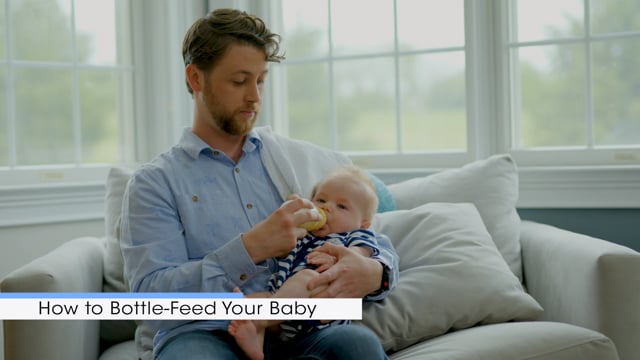Formula Feeding FAQs: How Much and How Often
Whether you plan to formula feed your baby from the start, want to supplement your breast milk with formula, or are switching from breast milk to formula, you probably have questions.
Here are answers to some common questions about formula feeding.
How Often Should I Feed My Baby Formula?
Newborns and young babies should be fed whenever they seem hungry. This is called on-demand feeding.
After the first few days of life, most healthy formula-fed newborns feed about every 2–3 hours. As they get bigger and their tummies can hold more milk, they usually eat about every 3–4 hours. As babies get older, they’ll settle into a more predictable feeding routine and go longer stretches at night without needing a bottle.
Talk to your doctor if you have concerns about feeding your baby, especially if your baby is very small, is not gaining weight, or was born early (prematurely).

How to Bottle-Feed Your Baby
With a little preparation and practice, you can learn to safely feed your baby breastmilk or infant formula from a bottle.
How Can I Tell When My Baby Is Hungry?
Signs that babies are hungry include:
- moving their heads from side to side
- opening their mouths
- sticking out their tongues
- placing their hands, fingers, and fists to their mouths
- puckering their lips as if to suck
- nuzzling again their mothers' breasts
- showing the rooting reflex (when a baby moves its mouth in the direction of something that's stroking or touching its cheek)
Babies should be fed before they get upset and cry. Crying is a late sign of hunger. But every time your baby cries is not because of hunger. Sometimes babies just need to be cuddled or changed. Or they could be sick, tired, too hot or too cold, in pain, or have colic.
How Much Formula Should I Feed My Baby?
In the first few weeks, give 2- to 3-ounce (60- to 90-milliliter) bottles to your newborn. Give more or less depending on your baby’s hunger cues.
Here's a general look at how much your baby may be eating at different ages:
- On average, a newborn drinks about 1.5–3 ounces (45–90 milliliters) every 2–3 hours. This amount increases as your baby grows and can take more at each feeding.
- At about 2 months, your baby may drink about 4–5 ounces (120–150 milliliters) every 3–4 hours.
- At 4 months, your baby may drink about 4–6 ounces (120-180 milliliters) at each feeding, depending on how often they eat.
- By 6 months, your baby may drink 6–8 ounces (180–230 milliliters) about 4–5 times a day.
Watch for signs that your baby is hungry or full. Respond to these cues and let your baby stop when full. A baby who is full may suck with less enthusiasm, stop, or turn away from the bottle.
Why Does My Baby Seem Hungrier Than Usual?
As babies grow, they begin to eat more at each feeding and can go longer between feedings. Still, there may be times when your little one seems hungrier than usual.
Your baby may be going through a period of rapid growth (called a growth spurt). These can happen at any time, but in the early months are common at around:
- 7–14 days old
- between 3–6 weeks
- 4 months
- 6 months
During these times and whenever your baby seems especially hungry, follow their hunger cues and continue to feed on demand, increasing the amount of formula you give as needed.
Is My Baby Eating Enough?
At times, you may wonder whether your baby is getting enough nutrients for healthy growth and development. Babies who get enough to eat seem satisfied after eating and are regularly peeing and pooping.
At your baby’s checkups, the doctor will review your baby’s growth chart, track your little one’s development, and answer any questions. Talk to your doctor if you have any concerns about your baby’s feeding and nutrition.
